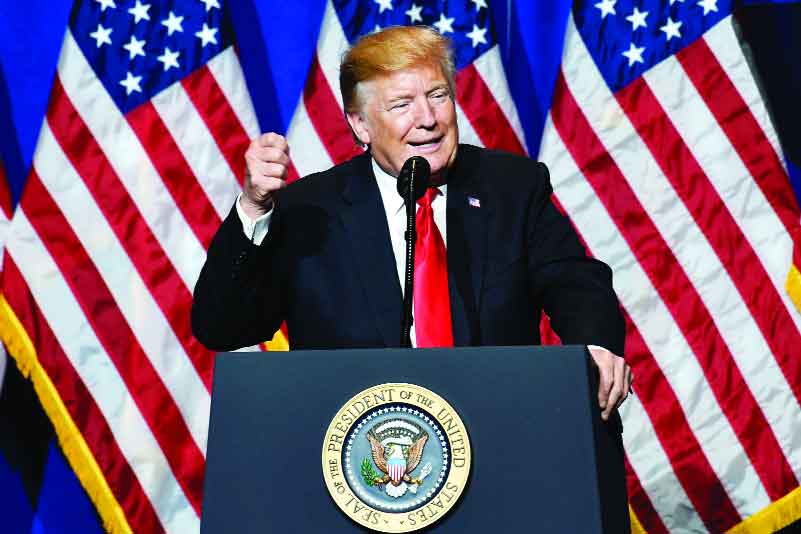AI Rulebook: Trump Administration's Influence On European Policy

Table of Contents
The "America First" Approach and its Transatlantic Ripple Effect
The Trump administration's prioritization of national interests over international cooperation on AI had a profound ripple effect across the Atlantic. This "America First" approach, while boosting domestic AI initiatives in the US, created a vacuum in global AI governance and spurred Europe to forge its own independent regulatory path.
-
Focus on domestic AI development and less emphasis on international standards: The administration prioritized funding and support for domestic AI research and development, often at the expense of collaborative international projects and the establishment of universally accepted AI standards. This inward-looking strategy contrasted sharply with the European Union's emphasis on global cooperation and the harmonization of AI regulations.
-
Reduced participation in international AI collaborations: The US's withdrawal or diminished participation in key international AI initiatives created uncertainty and hampered the development of global norms and best practices. This lack of US leadership left a void that other nations, including those in the EU, sought to fill.
-
Protectionist trade policies impacting AI technology and data flow between the US and Europe: Protectionist measures and trade disputes introduced uncertainty and friction into the transatlantic flow of AI technologies and data. This impacted both US and European companies involved in AI development and deployment, forcing many European businesses to consider alternative suppliers and strategies.
-
Uncertainty regarding data privacy and security agreements between the US and EU: The Trump administration's approach to data privacy and security raised serious concerns within the EU, especially regarding the adequacy of US safeguards for EU citizens' personal data. This uncertainty further fueled the EU's drive for greater data sovereignty and control.
This "America First" approach inadvertently accelerated the development of a robust and independent European AI strategy, prioritizing the creation of a distinct AI Rulebook reflecting European values and priorities.
Impact on Data Privacy and Security
The Trump administration's stance on data privacy and security significantly influenced European AI policy, highlighting fundamental differences in approaches to data protection and surveillance.
-
Concerns over US surveillance practices and their impact on EU citizens' data: Concerns over US government surveillance practices, particularly in the context of national security, led to increased skepticism within the EU regarding data transfers to the US. This fueled the EU's commitment to robust data protection measures.
-
The weakening of the Privacy Shield agreement and the subsequent need for a new framework (e.g., the EU-US Data Privacy Framework): The invalidation of the Privacy Shield agreement, a mechanism for facilitating data transfers between the EU and the US, created a significant legal hurdle for transatlantic data flows. This necessitated the development of alternative frameworks, such as the EU-US Data Privacy Framework, but even these have faced scrutiny and challenges.
-
Increased emphasis on data localization and sovereignty within the EU: The uncertainty around US data protection policies strengthened the EU's focus on data localization and sovereignty, meaning keeping data within EU borders whenever possible. This became a central tenet of European AI policy.
-
The role of GDPR in shaping the European response to data privacy concerns, in light of the US approach: The General Data Protection Regulation (GDPR), already in place before the Trump administration, played a critical role in shaping the European response. It reinforced the EU’s commitment to strong data protection and influenced the development of subsequent AI-specific regulations.
These differences in approaches to data protection have led to significant divergence in the development and deployment of AI across the Atlantic, creating both challenges and opportunities for businesses operating in both regions.
The Rise of European AI Sovereignty
The Trump administration's policies inadvertently fostered the development of a more assertive and independent European AI strategy, prioritizing what is often referred to as "AI sovereignty."
-
Increased investment in European AI research and development: The need to reduce reliance on US technology spurred increased investment in European AI research and development, fostering innovation and the growth of a more independent European AI ecosystem.
-
Development of the EU's AI Act and other regulatory frameworks: The desire for AI sovereignty manifested in the development of the ambitious EU AI Act, aiming to regulate AI systems based on risk levels, and other regulatory frameworks designed to ensure the ethical and responsible development and deployment of AI in Europe.
-
Focus on ethical AI and the development of AI systems aligned with European values: The EU has placed a significant emphasis on the ethical implications of AI, aiming to develop AI systems that align with European values such as transparency, fairness, and accountability. This is a key differentiator from the US approach.
-
Strengthening of partnerships with other countries and regions to develop alternative AI governance models: Europe has actively sought to strengthen partnerships with other countries and regions that share similar values and regulatory approaches, aiming to establish alternative AI governance models to those promoted by the US.
This shift towards AI sovereignty signifies a major geopolitical development with implications for the global AI landscape. Europe is actively shaping its own AI Rulebook, distinct from that of the United States.
Specific Examples of Policy Divergence
A clear example of policy divergence lies in the differing approaches to facial recognition technology. While the US has seen a relatively less regulated approach, the EU's AI Act proposes stricter controls and potentially even bans on certain high-risk applications of this technology. Similarly, the approach to data privacy, as highlighted by the GDPR and its influence on the EU AI Act, stands in stark contrast to the more laissez-faire approach prevalent in certain sectors of the US. These differences are reflected in specific policy documents and legislation from both sides, demonstrating a clear divergence in the development of their respective AI Rulebooks.
Conclusion
The Trump administration's "America First" approach to AI significantly impacted European policy, accelerating the development of a more independent and ethically-driven European AI strategy. The focus on data privacy, sovereignty, and ethical considerations within the EU's AI framework demonstrates a clear divergence from the US approach. Understanding this historical context is crucial for navigating the complex landscape of international AI governance. The differences in approach highlight the need for ongoing dialogue and cooperation, even as the EU and US continue to chart distinct paths in AI regulation. To learn more about the ongoing evolution of this critical policy area, further research into the AI Rulebook, specifically focusing on the impact of the Trump Administration and its legacy on European Policy is recommended. Understanding the nuances of this AI Rulebook is essential for anyone involved in the field of AI.

Featured Posts
-
 The Hollywood Strike What It Means For The Entertainment Industry
Apr 26, 2025
The Hollywood Strike What It Means For The Entertainment Industry
Apr 26, 2025 -
 7 New Orlando Restaurants To Explore Beyond Disney World In 2025
Apr 26, 2025
7 New Orlando Restaurants To Explore Beyond Disney World In 2025
Apr 26, 2025 -
 Designing For Humanity In The Age Of Ai A Conversation With Microsoft
Apr 26, 2025
Designing For Humanity In The Age Of Ai A Conversation With Microsoft
Apr 26, 2025 -
 The Challenges Facing Premium Automakers In China A Case Study Of Bmw And Porsche
Apr 26, 2025
The Challenges Facing Premium Automakers In China A Case Study Of Bmw And Porsche
Apr 26, 2025 -
 Will Ukraine Join Nato Trumps View And Geopolitical Ramifications
Apr 26, 2025
Will Ukraine Join Nato Trumps View And Geopolitical Ramifications
Apr 26, 2025
